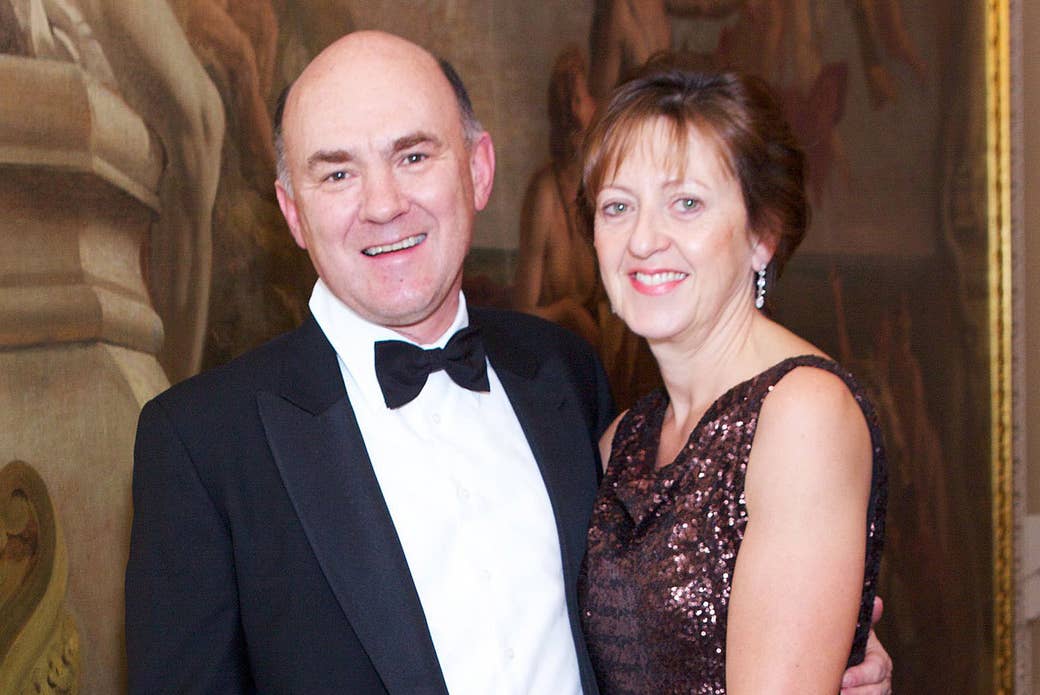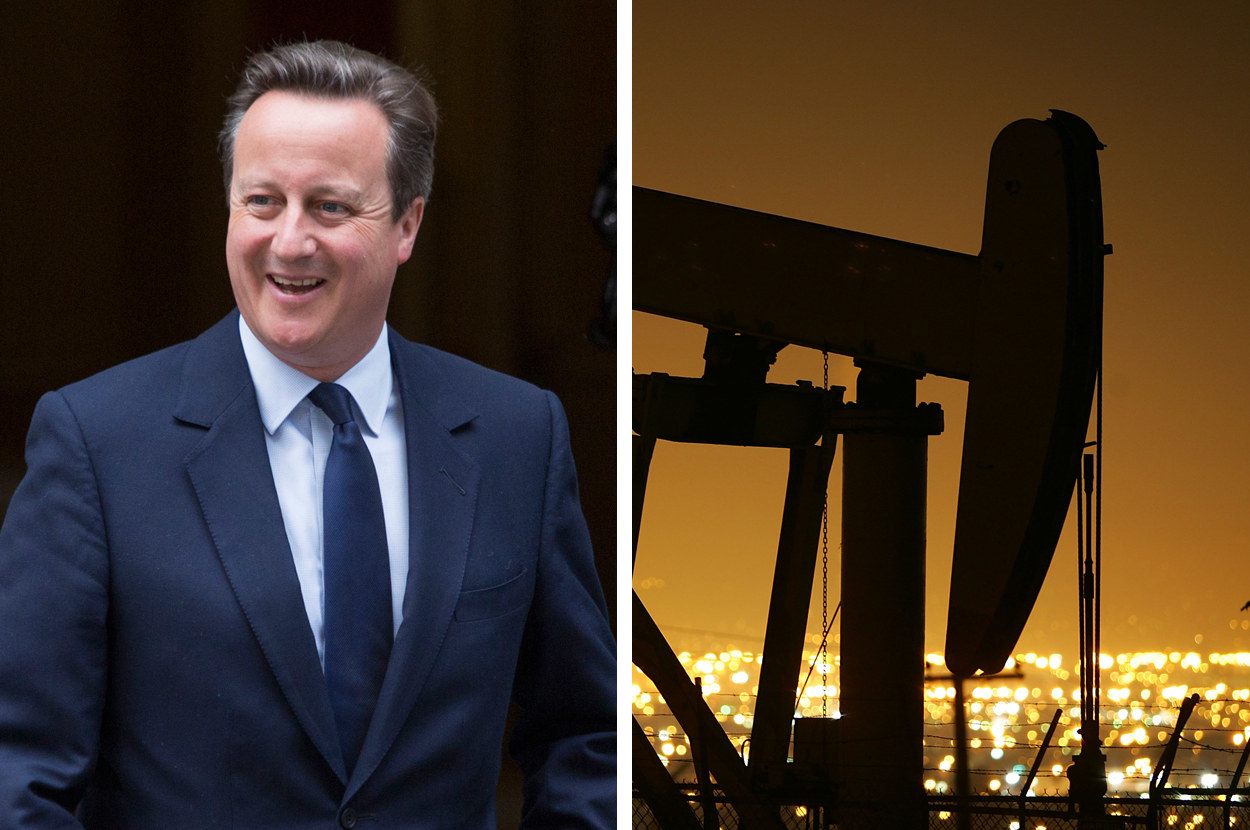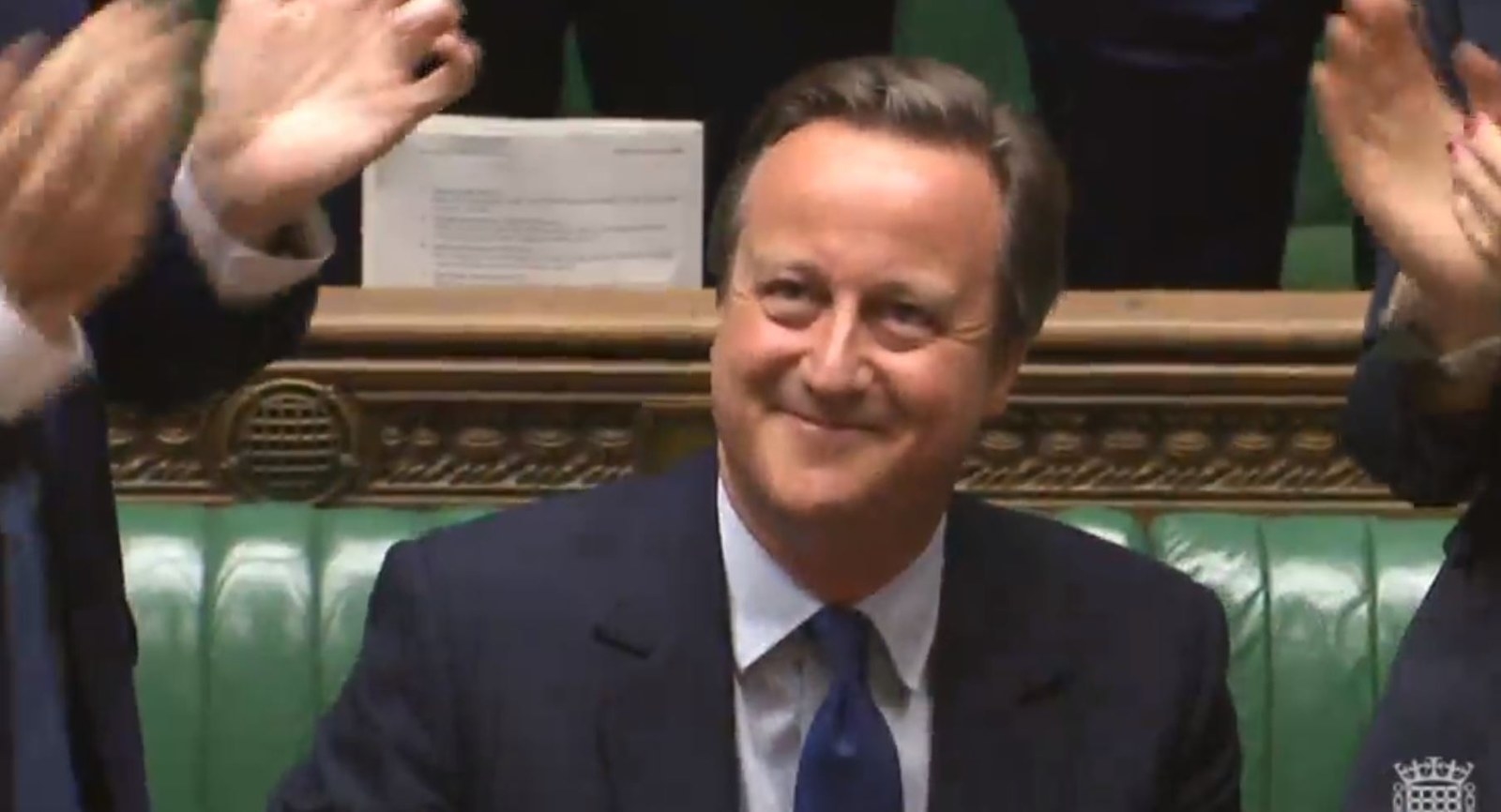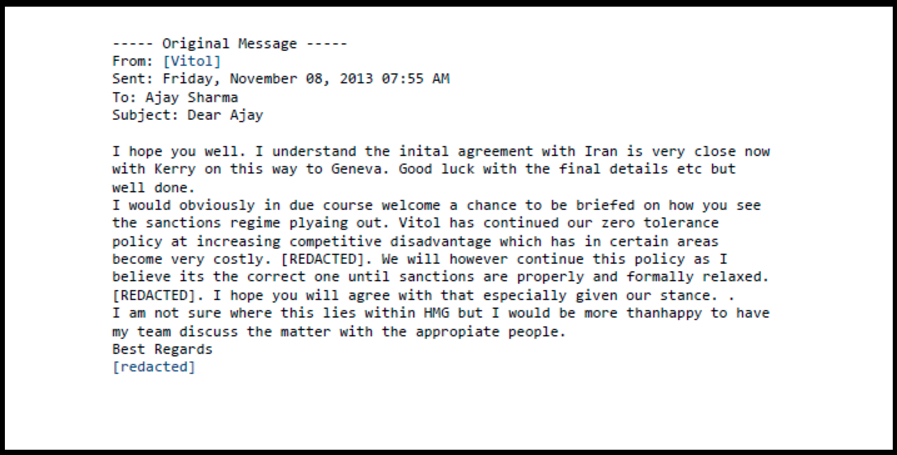
The chief executive of the world’s biggest oil trading company, Vitol, made repeated reference to his status as a Conservative party donor in email correspondence with a minister, BuzzFeed News can reveal.
The emails, obtained through the Freedom of Information Act, show ties between Vitol's multimillionaire chief executive and the Conservative government.
CEO Ian Taylor has donated more than £1.4 million to the Conservatives, including £15,000 to Theresa May’s leadership bid. He has dined with ministers at black tie events. His company, meanwhile, has employed two former Tory ministers and engaged in dialogue with top civil servants on matters of sensitive foreign policy.
Vitol denies having any special access to the UK government – and said it enjoys stronger ties with overseas governments.
One transparency campaigner said the party's relationship with the company's chief executive suggested May’s government was maintaining a policy where donors “pay enough and the door swings open” for them.
Taylor was certainly prepared to mention his status as a contributor to the Conservative party in his emails to ministers, as one email sent to Sir Michael Fallon – now the defence secretary, but then an energy minister – in August 2013 shows.
“Further to our recent meet in your offices and the PMs very successful trip to Kazachstan [sic] I wanted to see if informally there was potentially any interest in you joining what I believe is one the best conferences on this area with a very strong energy slant,” Taylor writes to Fallon about a conference in Ukraine.
He notes “the guest list will be very strong with both the Clintons expected to be there” before mentioning his status as a member of the Leader’s Group, which gives access to ministers at evening events for those who donate more than £50,000 a year to the party.
The group's access to senior Conservatives is arranged only through lunches, dinners, and drinks receptions – and Vitol told BuzzFeed News Taylor's status as a donor "makes no difference" to its official access to ministers and departments.
Taylor's email was sent to Fallon's ministerial email address, but CC'd to Andrew Feldman, then the chairman of the Conservative party, further blurring the lines between party and governmental business.
“I realise diaries are extremely tight but as a Leaders Group member I do think it would be good for the UK to be represented,” Taylor's email to Fallon continues. Later in the message, after noting Vitol has a joint venture producing gas in the region where the conference will take place, he mentions another Conservative fundraising function he expects to see Fallon attending.
“I look forward to seeing you at the Carlton Dinner where I am pleased to say we have a full house and hopefully a good evening,” he concludes.

“I do believe there are some changes that could be made”
Taylor has given more than £1.4 million to the Conservative party since 2010, and also helped fund the Remain campaign during the EU referendum.
His company is a global one – founded in the Netherlands, headquartered in Geneva, and operating across the world – but Taylor and many of his key executives generally work from the company’s UK offices in Belgrave House, on Buckingham Palace Road in central London. The company has a reputation for secrecy – it is not publicly listed and so is not required to disclose as much information as many of its rivals – but it had revenues of more than $168 billion last year, and traded more than 300 million tonnes of oil products.
Taylor was unsuccessful in persuading Fallon to attend the conference, but appears to have received more positive responses to other correspondence.
In October 2013, he wrote again to Fallon, this time about UK and EU refineries. Vitol does not operate any refineries in the UK, but does have several in other European countries.
“I am sure you are aware the UK and European refinery system remain under considerable threat and we at Vitol sadly expect more closures next year,” Taylor wrote.
He appeared offer to discuss with Fallon some ways in which the UK could help make changes "to assist the overall refining industrys [sic] position", as well as to update the minister on "the power markets" since Vitol's takeover of a power plant in Humberside. “I do believe there are some changes that could be made,” Taylor said.
Fallon wrote back to Taylor in November 2013, stating “I have asked my officials to make contact with Vitol” as part of discussions with industry.

A spokeswoman for Vitol told BuzzFeed News Taylor’s communication about the UK refineries was “disinterested”.
“Please note that there was no possibility of Vitol benefiting commercially from any conversation about the UK’s refining industry as Vitol is not invested in any UK refineries (we are in other countries – Australia, Belgium, Germany, Switzerland and UAE),” she said in a statement.
“Mr Taylor’s seeking to discuss the UK refining industry with Mr Fallon arose solely from his desire to assist the UK based industry. To reiterate, neither Vitol nor Mr Taylor has any investments in this industry and Mr Taylor’s intervention was completely disinterested.”
BuzzFeed News contacted No. 10 to ask if the prime minister had any concerns about business leaders referring to their status as party donors when communicating with ministers, and whether such arrangements should be reviewed.
A response came from the Conservative party ignoring BuzzFeed News' specific questions but instead stating: “All donations to the Conservative Party are properly and transparently declared to the Electoral Commission, published by them, and comply fully with Electoral Commission rules.”

A “fine-tooth comb”
Taylor’s Conservative party ties have proven a headache for David Cameron, especially during the very public row over his departing resignation list. A copy of the list leaked to the media in summer showed the outgoing PM had recommended the Vitol CEO for a knighthood.

Press reports at the time said one reason the list was proving controversial in Whitehall was civil service concerns about honours for party donors, with one source noting such recommendations are examined by officials with a “fine-tooth comb”.
Following the press leak, Taylor asked that his name be removed from consideration.
“Speculation in the media has suggested that I may be recognised in the forthcoming resignation honours list. This has been accompanied by seriously inaccurate comments about the company I lead,” he said.
“In these circumstances, I think it is right I request that my name does not go forward.”

Controversial dealings
Vitol has had a difficult public reputation after spending years embroiled in a scandal relating to the oil-for-food programme in Iraq, a UN-organised deal when Saddam Hussein ran the country to prevent sanctions leading to starvation.
The programme was beset with allegations of bribery and kickbacks from officials, with Vitol this summer taking a €300,000 fine earlier this year from the Paris Court of Appeal. The company at the time said it was “extremely disappointed” with the ruling, denied it was guilty of corruption, and said it would appeal against the decision. The company had pleaded guilty in 2007 in a US case relating to the programme, paying $17.5 million in fines.
Vitol faced public controversy again in 2012, this time over sanctions in Iran. At the time, the US and the EU were tightening oil sanctions on Iran to pressure the country into stopping its nuclear programme. During the summer, Reuters reported a Vitol subsidiary had bought oil of Iranian origin in a deal that, though legal, drew criticism.
The company confirmed the purchase a few months later in September, though it stressed it hadn’t breached sanctions.
Correspondence seen by BuzzFeed News shows Vitol maintained close communication with some of the UK’s most senior officials over Iran’s sanctions, complaining that strict compliance was costing the company dear.
The first email, from May 2013, refers to a meeting between Vitol and Robert Hannigan, then a senior Foreign Office official but now the head of GCHQ.
In it, a different Foreign Office (FCO) official writes: “As the FCO official responsible for Iran policy, Robert has asked me to follow up on your kind offer in your email to discuss Iranian oil flows.”

Another email sent from Vitol to the same official in November that year shows the company seeking updates about US secretary of state John Kerry’s nuclear deal with Iran, which was being negotiated at the time.
“I would obviously in due course welcome a chance to be briefed on how you see the sanctions regime plyaing [sic] out,” the Vitol staffer writes. “Vitol has continued our zero tolerance policy at increasing competitive disadvantage,” they say, noting that following sanctions had become “very costly”.

“We have no clue who is bending their ear”
Iran’s sanctions are not the only sensitive foreign policy area in which Vitol has been involved – and one of these has drawn claims of “revolving door”-style relations.
In 2011, Conservative minister Sir Alan Duncan – then minister at the Department for International Development (DfID), now at the Foreign Office – helped negotiate a deal worth hundreds of millions of pounds with several oil companies, including Vitol, to supply oil to rebels in Libya.
There was no suggestion of impropriety on the part of Duncan or Vitol in connection to the deal, though one Labour MP suggested there was an inherent “conflict of interest” due to Taylor’s status as a major party donor.
After leaving DfID for the back benches, Duncan was then appointed as chairman of a Vitol subsidiary in February 2016 at a salary of £8,000 a month. He ended up serving just five months in the role, as Theresa May invited him to rejoin the government, but he received a £50,000 severance payment for standing down as chair.
Duncan received approval from the advisory committee on business appointments to take the job, as required by the ministerial code.
Vitol also appointed Charles Hendry, another former minister and an MP at the time, as an adviser in 2014 for £60,000 a year. Hendry stood down from parliament in the 2015 election.
Tamasin Cave, the director of the transparency coalition Spinwatch, said Vitol’s ties to government signified May needed to make changes to support her claims to not be acting for a “privileged few”.
“It has long been the case that if you are generous towards the Conservative party, they will be generous in return,” she said. “Pay enough and the door swings open, there’s a seat next to the minister over dinner, and your narrow interests get a full hearing. And no one needs to know about it.
“Since Brexit, May’s promised to be driven not by the interests of these obviously 'privileged few', but by the public’s. But she’s changed absolutely nothing of the structures that allow it to happen: the secret dining clubs, the revolving door with lobbyists, the secrecy surrounding who ministers are meeting.
“It matters even more today. We have no clue who is bending their ear over Brexit, and what deals are being done.”
Charlie Kronick, senior climate adviser at Greenpeace UK, echoed calls for May to change her relationship with companies and figures across the energy industry, criticising David Cameron's approach to the sector.
"From appointing a former BP boss to a senior government role to schmoozing with oil barons over dinner, the Cameron administration had an all too cosy relationship with the fossil fuel industry,” he told BuzzFeed News.
"As the twilight of the oil age sets in, the prime minister should ignore the swan song of the fossil fuel lobby and put clean technologies firmly at the heart of her industrial strategy."
A spokeswoman for Vitol told BuzzFeed News that its subsidiary’s severance payment to Duncan was “in line with contractual obligations”, adding “we disagree that it is accurate to describe two former ministers as a ‘revolving door’”.
The company also challenged claims it had good access to the UK government and that its access was related to its chief executive’s donations, and said it had closer ties with other governments.
“Mr Taylor’s donor status makes no difference to Vitol’s access to the UK government … It is not accurate to state that Vitol has a ‘high degree of access’, especially when compared with other companies of its size,” its spokeswoman said.
“Vitol seeks to have an open and constructive relationship with the authorities in all the jurisdictions in which we operate. To this end, we will always cooperate with the authorities and if our knowledge and expertise can be of assistance to them, we are happy to help.
“Please note that the UK represents a small part of Vitol’s business and Vitol engages more with the other governments than it does with the UK government.”
